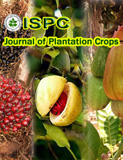Perception of farmers on the impact of lockdown due to Covid-19 on agriculture and oil palm cultivation in the state of Andhra Pradesh, India
DOI:
https://doi.org/10.25081/jpc.2022.v50.i1.7784Abstract
A study was conducted to find the impact of lockdown due to the pandemic of coronavirus disease 2019 (COVID-19) on agriculture, in general, and on oil palm cultivation, in specific. Results revealed that the majority of the farmers contacted had 26-30 years of farming experience, were between 31-60 years of age, were educated up to high school level, with an average of four family members and possessed medium landholdings. The crops grown by these farmers include oil palm, maize, coconut, paddy, cocoa and vegetables. The majority of them had irrigated dry lands. All the farmers were aware about the reasons for the lockdown due to the COVID-19 pandemic. Areas where lockdown impact was visible on agriculture, either directly or indirectly, include labour availability, high cost of labour, harvesting, transport, and market prices. Resources affected due to lockdown were labour, fertilizers, harvesting, transport etc. All cultural practices were adopted in oil palm. The majority of the respondents perceived that oil palm was not affected compared to other crops during the lockdown; they opined to have obtained a good market price for oil palm during the lockdown period. Most of them informed that they received oil palm cultivation related messages sent by ICAR-IIOPR, Pedavegi. They perceived to be aware of the technologies during the lockdown period. Messages (SMS) on oil palm irrigation, cultivation practices, and fertigation were adopted. The need for Government assistance during the lockdown period was felt in the following aspects for different crops, viz., marketing, cultivation assistance, and transport. Farmers perceived that lockdown might have long-term implications due to the non-availability of labour for harvesting crops. It is evident from the study that crops affected severely during the lockdown period require long term strategies to mitigate the problems faced. Farmers must be supported with minimum support price (MSP), transport facilities and ad hoc strategies to sell their products through the government purchase mechanism. A need for monitoring the increase in the prices of agricultural inputs was also felt.
Downloads
References
Ceballos, F., Kannan, S. and Kramer, B. 2020. Impacts of a national lockdown on smallholder farmers’ income and food security: Empirical evidence from two states in India. World Development 136: 105069. https://doi.org/10.1016/j.worlddev.2020.105069.ICAR (2020)
Innovative agri solutions during COVID-19. Indian Council of Agricultural Research. https://icar.org.in/sites/default/files/Innovative_Agri-Solutions_COVID-19-2020-1106.pdf.
Jaacks, L.M., Veluguri, D., Serupally, R. Aditi Roy, Poornima Prabhakaran and Ramajaneyulu G. V. (2021) Impact of the COVID-19 pandemic on agricultural production, livelihoods, and food security in India: Baseline results of a phone survey. Food Security 13: 1323–1339.
NABARD (2020) Impact assessment of COVID-19 on Indian Agriculture and Rural economy. Department of Economic Analysis and Research. Mumbai. https://www.nabard.org/auth/writereaddata/tender/1211203145Impact%20Assessment%20of%20COVID.pdf.
Kumar, P., Singh, S.S., Pandey, A.K., Singh, R.K., Srivastava, P.K., Kumar, M., Dubey, S.K., Sah, U., Nandan, R., Singh, S.K. and Agrawal, P. 2021. Multi-level impacts of the COVID-19 lockdown on agricultural systems in India: The case of Uttar Pradesh. Agricultural Systems 187: 103027. https://doi.org/10.1016/j.agsy.2020. 103027.
Published
How to Cite
Issue
Section
Copyright (c) 2022 Journal of Plantation Crops

This work is licensed under a Creative Commons Attribution 4.0 International License.







 .
.